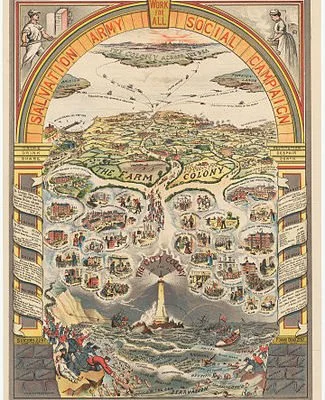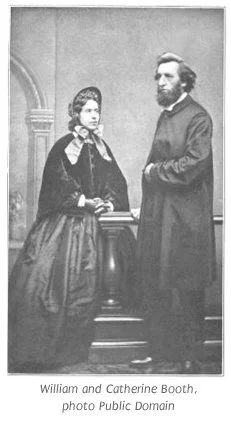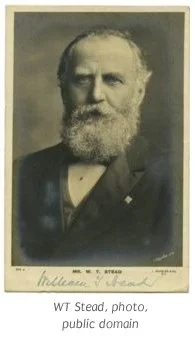The Salvation Army and Child Trafficking in the Victorian Era
There were hundreds, perhaps thousands, of organizations intent on doing good for others in the Victorian Era; it’s heartening, and perhaps a little convicting, to see how many people were dedicated to lifting the misery of others. In this book, though, I focused not only on the Theatrical Mission (which really did exist!) but also drew inspiration from the Salvation Army, a vibrant organization for good in London and, eventually, the entire world. In this book, all the best parts of the ministries of The Cause were inspired by the work of the Salvation Army, a powerful tour de force for good in Victorian England. The news clippings I had Gillian read from her mother’s scrapbooks were nearly exactly reproduced from actual clippings about the Salvation Army during the mid-to late-nineteenth century.
The Salvation Army was founded in 1865 by William Booth and his wife, Catherine. Both William and his wife Catherine preached, though William generally reached out to the poor and undesirables they felt led to minister to, including prostitutes, alcoholics, morphine addicts, and the destitute, and Catherine raised funds from the wealthy. Their many children eventually joined them in ministry, and one son, Bramwell, was drawn to the cause of the exploitation of children. From the Salvation Army’s website:
"The law, as it stood in the early 1880s, said that a girl of thirteen was legally competent to consent to her own seduction. Girls under the age of eight were not allowed to give evidence against those who had abused them, as it was thought that they were too young to understand the oath. Josephine Butler, a campaigner for women's rights, wrote a letter to Florence Booth, the wife of The Salvation Army's Chief of the Staff, Bramwell Booth, concerning the sale of young girls into prostitution. We have this letter and other correspondence relating to the case, including letters from Catherine Booth, The Army Mother, to Queen Victoria.
Florence Booth, as pioneer leader of the Army's Women’s Social Work, gained an insight into the lives of girls working as prostitutes. Through this work, the practice of trafficking girls to be used for immoral purposes, both in Britain and overseas, came to the attention of The Salvation Army. Bramwell Booth had walked the streets of London, seeing for himself the desperate situations many of the young girls found themselves in. What he saw prompted him to speak with W. T. Stead, Editor of the Pall Mall Gazette.
Stead admired The Salvation Army and was horrified to think that young girls were being bought and sold. He investigated the Salvation Army's claims and published his findings in the Pall Mall Gazette from 6 to 10 July 1885. The articles appeared under the title ‘The Maiden Tribute of Modern Babylon,’ and Stead received much support. On 14 August 1885, the Criminal Law Amendment Act became law, raising the age of consent from thirteen to sixteen years.
Stead has been said to have been heavily influenced by his mother, an early crusader for the proper treatment of all women, including prostitutes. Sadly, after helping women and children into lifeboats and giving away his life jacket, Mr. Stead was among the victims of the sinking of the Titanic; his valor persisted till the end of his days.
Main photo: By William Booth - Cornell University: Persuasive Cartography: The PJ Mode Collection, Public Domain, https://commons.wikimedia.org/w/index.php?curid=44963597


